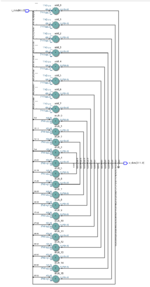rafimiet
Member level 5
I am trying to make a generic design for a filter. The filter works on different sizes of inputs from 2x2 to 64x64 and therefore the input needs to be multiplied by a coefficient matrix of corresponding sizes. I tried the following:
c_mult chooses between constants of different sizes. I synthesized this but it seems that it is not simulatable...
Then I tried the following:
But again, it is not simulatable and I get the following error:
<Moderator action: changed to syntax vhdl tag for VHDL syntax highlighting>
Code VHDL - [expand]
c_mult chooses between constants of different sizes. I synthesized this but it seems that it is not simulatable...
Then I tried the following:
Code VHDL - [expand]
But again, it is not simulatable and I get the following error:
So is there a way of generating a generic code for this?(82) At depth 2, array length is 6; aggregate length is 126
(83) At depth 2, array length is 6; aggregate length is 64
(84) At depth 2, array length is 6; aggregate length is 64
<Moderator action: changed to syntax vhdl tag for VHDL syntax highlighting>
Last edited by a moderator:

